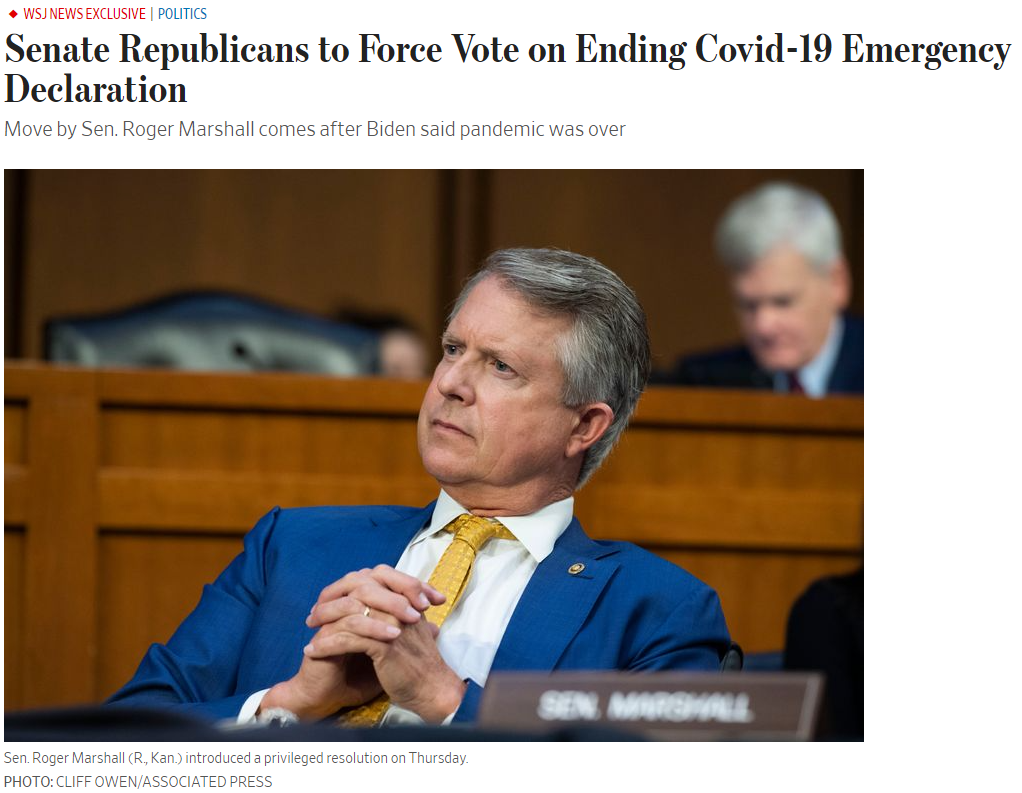WSJ: Sen. Marshall to Force Vote on Ending Covid-19 Emergency Declaration
(Washington, DC., September 22, 2022) — Today, the Wall Street Journal covered the latest effort by U.S. Senator Roger Marshall, M.D. to end the COVID-19 national emergency declaration that is still in effect under the National Emergencies Act (NEA). Senator Marshall’s resolution follows President Joe Biden’s comments that the coronavirus pandemic is over, yet the national emergency for COVID-19 has yet to be terminated by the White House. Senator Marshall spoke with the Wall Street Journal in an exclusive interview about his resolution and you may click HERE or on the image below to read the story.
Upon introducing his resolution, Senator Marshall issued this statement:
“Since President Biden used his appearance on 60 Minutes to declare COVID is over, he must immediately terminate the COVID-19 national emergency declaration and wind down other emergency authorities that his Administration continues to force us to live under. The American people are fatigued and yearning to operate outside of the confines of supersized government; they long for their God-given freedoms, and for leaders to take their side,” said Senator Marshall. “In March the U.S. Senate voted for my Resolution to repeal this emergency declaration and delivered a symbolic victory that limited government and our constitutional rights still reign supreme. It’s high time for Joe Biden and his Administration to stop using COVID to implement their partisan political agenda and focus on the surge in crime and the fentanyl epidemic that is wreaking havoc across this nation and killing Americans at record rates.”
Background:
In March 2020, President Donald Trump invoked the NEA in regard to COVID-19. In February 2021 and then again in February 2022, President Joe Biden extended it. A provision in the NEA grants Congress termination review of national emergencies, stating that after six months, and every six months after the emergency continues, “each House of Congress shall meet to consider a vote on a joint resolution to determine whether the emergency shall be terminated.” However, Congressional interpretation of this law has determined that the absence of a resolution introduced by any member signals unanimous consent for continuation. In failing to meet, debate, and vote on an emergency, Congress is effectively ceding more unchecked emergency powers to the executive similar to its failure to enforce War Powers provisions.
On March 3, 2022, Senator Marshall’s resolution to end the COVID-19 national state of emergency passed the Senate by a vote of 48-47. On that same day, the White House issued a veto threat of Sen. Marshall’s resolution, and the U.S. House of Representatives failed to take up the measure. Under the NEA, Congress is mandated to determine whether the emergency should continue, a process Congress has not fully enforced, ceding power to the executive. You may click HERE to view the resolution. Senators Mike Braun (IN), Mike Lee (UT), Ted Cruz (TX), and Rand Paul (KY) Rick Scott (FL), Steve Daines (MT), Ron Johnson (WI), and James Risch (ID) cosponsored Senator Marshall’s resolution. The NEA outlines an expedited parliamentarian procedure for emergency termination resolutions. Once the resolution is introduced and approved by the parliamentarian, it is referred to the Committee of jurisdiction, the Senate Committee on Finance in this instance. The committee of referral is to report one joint resolution along with its recommendations within 15 calendar days after the day of referral, unless the chamber “shall otherwise determine by the yeas and nays.” Once reported, the terminating resolution “shall become the pending business” of the chamber and a vote on final passage is to occur within three calendar days thereafter (unless the chamber “shall otherwise determine by yeas and nays”).
###

